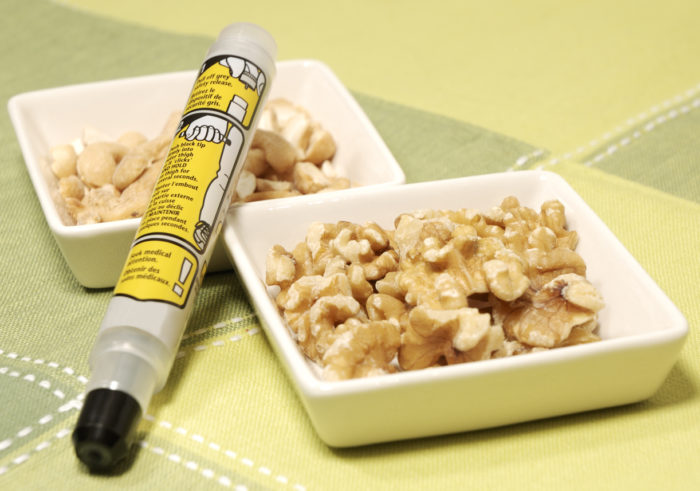Are EpiPens Friend or Foe?
7 Deaths Associated With Medical Device
EpiPens exist to save lives or stave off severe allergic reactions to drugs, foods, insect bites and other causes of anaphylaxis. They are pocket-sized cylindrical devices that, in case of an episode, quickly can be uncapped and injected into the outer thigh for near-instant relief. In an emergency, the pen can be administered through clothing.
They are an ingenious example of advances in medicine – a handheld tube that contains epinephrine, a chemical that works like adrenaline, narrowing the blood vessels and opening the airways, enabling a 3-year-old boy to overcome what would have been a fatal event after drinking a cup of milk. In that case, which occurred in 2014, the EpiPen malfunctioned but fortunately did not fail.
Here is an account of the unfortunate incident via Bloomberg.
“Paulette saw it happen at the playground from several feet away, the panic-inducing moment in 2014 when her 3-year-old son Charlie, who has a life-threatening allergy to milk, grabbed a playmate’s sippy cup and took a gulp,” begins the article, titled “EpiPen Failures Cited in Seven Deaths This Year, FDA Files Show.” “Thankfully, Paulette had the anaphylaxis-stopping EpiPen and was able to quickly use the auto-injector on her son. But when she pulled the needle from his thigh, it was sticking out of the device at an angle instead of being under an orange cover, leaving her unsure whether the lifesaving medicine had been administered. Not wanting to take a chance, Paulette (who requested anonymity to protect her son’s identity) called 911, and Charlie was rushed to a hospital where he remained for several hours until doctors were sure he was all right.”
He was, luckily. As the Bloomberg headline screams, seven deaths have been associated with malfunctioning EpiPens in 2017. The U.S. Food and Drug Administration (FDA) issued a notice of a recall by the manufacturer in May, prior to reports of the deaths. The recall was from Meridian Medical Technologies / Mylan N.V., affecting 13 lots of products thought to have deployment defects.
“This recall is due to the potential that these devices may contain a defective part that may result in the devices’ failure to activate,” the notice states. “While the number of reported failures is small, EpiPen products that potentially contain a defective part are being recalled because of the potential for life-threatening risk if a severe allergic reaction goes untreated.”
With news of the deaths, EpiPens have been called into question again, and rightfully so. According to the Bloomberg article, the FDA received 228 reports of failures of the EpiPen or the EpiPen Jr., which offers half the dose (.15 milligrams instead of EpiPen’s .3 milligrams.) The FDA found 35 patients ended up in the hospital because of the failures.
“This is a lifesaving product,” National Center for Health Research President Diana Zuckerman told Bloomberg. “If it fails 105 times, that’s significant.”
The failure seems to stem from a combination of rudimentary design, which gives it ease of use, and operator error. With the 3-year-old, the needle appeared bent when the EpiPen was removed from his leg, causing his mother to wonder whether the epinephrine had been injected.
“He was OK, but it was nerve-racking to say the least, not knowing if the EpiPen had worked or not,” she told Bloomberg.
A mother of a 6-year-old daughter had a similar experience after her little one ingested peanuts. The mother used the EpiPen, but when she pulled it out, she saw a bent needle. She successfully used a backup EpiPen.
“Watching your child sit there scream to you ‘don’t let me die’ is awful for any parent to have to go through,” the woman told CBS News in an article titled “Complaints of reported EpiPen failures has Mylan on defensive again.”
The EpiPen traces its history to inventor Sheldon Kaplan, whose ComboPen was developed for the U.S. military as an antidote for chemical warfare, i.e. nerve gas. That was in the 1970s. Kaplan then developed it as an antidote for anaphylaxis. The Greek word means “without protection.”
“Kaplan’s design releases a spring-loaded syringe pre-filled with a dose of adrenaline,” explains Healthline in an article titled “The Long, Strange History of the EpiPen.” “It’s designed to be delivered through a person’s clothing – eliminating the time-consuming act of filling a syringe and requiring no medical expertise beyond a short tutorial.”
That was then, and this is now. Anyone experiencing adverse events with the controversial EpiPen should submit an online form to the FDA’s MedWatch program at www.fda.gov/medwatch/report.htm.
Share This



